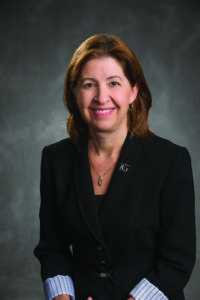What do solar panels and compost bins have in common? Both items correspond to progress on our community’s long-term environmental sustainability goals: 1) a 25% reduction in energy utilization and, 2) achieving the designation of being a zero-waste campus.

In the coming days, we will publicly announce that Gustavus has partnered with Minnesota-based Novel Energy Solutions to install a new solar array on campus that will generate approximately one megawatt of solar energy, increasing by ten times the campus’ current solar output of around 100 kilowatts. The new solar installation will be located near the Arbor View Apartments off Jefferson Avenue, and construction will begin later this spring. This investment in renewable energy represents a big step toward our overall goal of reducing our energy consumption on campus. In addition, the President’s Environmental Sustainability Council (PESC) is investigating how we can gain energy efficiency by retrofitting our physical plant infrastructure. The PESC is also working on various initiatives to encourage adoption of energy conservation habits by Gustavus students and employees.
I hope that you have noticed the new yellow compost bins outside our residence halls and the green compost bins in other campus buildings. For the first time, Gustavus has all the tools in place to achieve campus-wide composting. This is a big step towards achievement of our goal of being a zero-waste campus, which means that 10% or less of our waste goes to a landfill. Achieving this goal means that everyone on campus must make a commitment to properly sorting our waste–compost in the compost bins, recycling in the recycling bins, and trash (which will go to a landfill) in the trash bins. In addition, remember to collect all clean, dry, stretchy plastic and place it in the TREX plastic collection bins on campus (e.g., outside The Book Mark). We are participating in a program where 500 pounds of acceptable plastic film means that we get a durable bench made from recycled plastic. Our first benches from this program are currently located in front of the Book Mark.
Environmental sustainability is everyone’s job. It means being conscious about energy use. It means applying the principles of the 3 “Rs” of waste reduction (Reduce, Reuse, and Recycle) in everything we do. It means raising our awareness of all the small ways that we can substitute sustainable practices that help to counter our throw-away culture. It means finding ways to spread our best practices to our families and communities. Let’s all commit to being good stewards of our environment.
I would like to close by recognizing the good work of our Johnson Center for Environmental Innovation and PESC co-chairs Chuck Niederriter and Jeff Jeremiason, our new compost, waste, and environmental sustainability manager Kari Wallin, the Johnson Center student interns, the Environmental Studies faculty, and the dedicated students from the Environmental Action Coalition who continue to drive these important initiatives forward. This week, I ask all of our community to take a few extra seconds to make sure that your waste goes into the correct bin. Together, we can help create a cleaner and healthier environment for our community and for all people on the planet.
Until next week, keep up the good work, Gusties!
Yours in community,
President Bergman